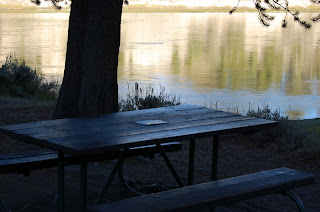 |
| The facade of Notre Dame |
 |
| One of the beautiful wood carvings in Notre Dame, but notice the dust! |
We departed Newark Airport for Tel Aviv (via Paris) on Sunday evening at 7:10 PM. The flight was uneventful (although there were some moments of pretty strong turbulence) and we arrived in Paris at about 9:30 AM. As our next flight, from Paris to Tel Aviv, was not scheduled to depart until 6:45 PM, we decided to go into Paris by rail, which takes less than an hour.
We headed for the area around Notre Dame and had breakfast at an outdoor cafe not far from the Cathedral. We discovered a lovely little park with a memorial to the Jewish children of France, 11,000 of them, who had been rounded up by the Nazis and killed in the extermination camps. After this, we went into the Cathedral and spent considerable time walking around it, then stayed for the noonday Mass. The Cathedral is extraordinary in every way and we especially appreciated the efforts made to assure that it is a living church and doesn't simply devolve into a museum for tourists. There were priests on duty in glass enclosed areas for confession and counsel and people were taking advantage of this ministry. It must be said, however, that the Cathedral is dusty and dirty and in much need of restoration and repair. Walls with lovely frescoes are noticeably peeling. Still, it is captivating.
After this, we found a small creperie and had crepes for lunch. Voila! Then back to the airport for our night time flight to Tel Aviv.
 |
| With Jerusalem and the Dome of the Rock behind us |
Again, our flight was uneventful, but we were pretty tired and both slept. We arrived in Tel Aviv and passed through immigration and customs without any trouble, We were met by Ehmet who was a driver sent to us from St. George's College who drove us the 40 minutes to the College. We passed through the door and were met by their nighttime security person who gave us our keys and showed us to our rooms. They are simple, sparsely furnished, like a college dorm room - 2 twin beds, two desks, two chairs, 4 lamps, 2 wardrobes, with a small individual bathroom. We were grateful to be here and found our way to bed pretty quickly.
Tuesday was pretty much a free day. We went into the Old City and then decided we wanted to do something different. We headed to the Israeli Museum only to find that it is closed until 4 PM on Tuesdays. We ended up going back to the College and napping. We needed that more than anything anyway.
On Tuesday evening we met the rest of the people participating in the course. There are about 30 of us total. There is a course director who will be delivering the lectures throughout our time. There are two monks, Brother Curtis and Brother David, from the Society of St. John the Evangelist in Cambridge, MA (Yes, we Episcopalians do have monks). They will lead our prayer lives during the next 14 days and will also offer meditations throughout. There are a couple of other staff members. Other than that, the group is mostly American, though there is a strong contingent of clergy from England participating. There are also a number of lay people; some clergy spouses, some not.
As I write, it is Wednesday night and we leave early in the morning for the Judean Desert and then we are heading for the Negev Desert where we will be spending the night in Bedouin style tents.
This morning we had our introductory lecture, delivered by The Rev. Dr. Andrew Mayes who is the Course Director and has expertise in Desert Spirituality.
He introduced us to four key themes of desert spirituality that we will be developing over the course of the next two weeks. Each has a Greek term that comes from the early desert fathers. They are:
Hesychias - quietude, stilling one's self from the external noise without and the internal noise within
Anachoresis - withdrawal from the demands and distractions of the everyday world to create space for what should be embraced
Eremia - solitude, aloneness, detachment
Askesis - discipline - like the athlete attempting to trim excess weight.
In most of the tradition of the desert fathers, this kind of withdrawal and separation was not merely or primarily for the sake of the self - a form of narcissistic navel gazing. It was about withdrawing from the clamor and noise of the world so that one could be more open to God and God's voice; so that one could listen and obey. Ultimately, this kind of withdrawal is for the sake of the community. This is, largely, what my sabbatical is about.
 |
| Behind us, the Judean Wilderness where we are headed tomorrow |
Basil the Great, one of whose leters Dr. Mayes used for his lecture today, was suspicious of those who were hermits for hermits sake. Understanding that Christian mission and ministry is always for the sake of others, Basil asked, "If I am alone, whose feet will I wash?" The reference is, of course, to Christ's example of servant leadership at the Last Supper, when he washed the disciples' feet and commanded them to do the same and to love one another. Tomorrow we go into the wilderness. I wonder what I will hear? I wonder who I will hear? Will it be the voice of God? That is my prayer and my deep hope and yearning.
Blessings and peace.

















